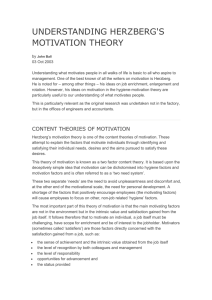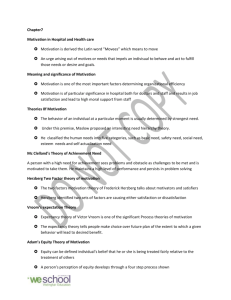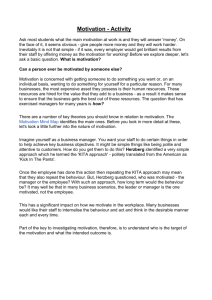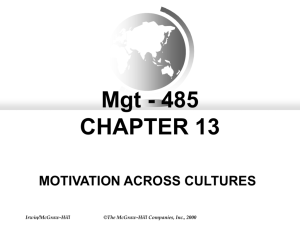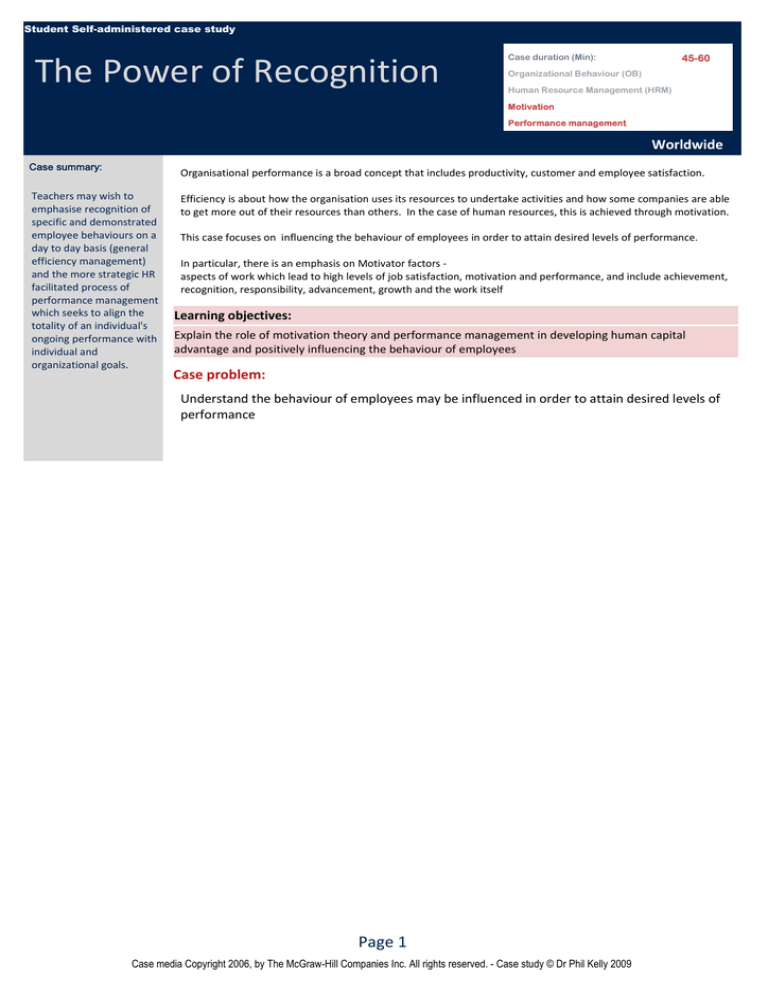
Student Self-administered case study
The Power of Recognition
45-60
Case duration (Min):
Organizational Behaviour (OB)
Human Resource Management (HRM)
Motivation
Performance management
Worldwide
Case summary:
Organisational performance is a broad concept that includes productivity, customer and employee satisfaction. Teachers may wish to emphasise recognition of specific and demonstrated employee behaviours on a day to day basis (general efficiency management) and the more strategic HR facilitated process of performance management which seeks to align the totality of an individual's ongoing performance with individual and organizational goals.
Efficiency is about how the organisation uses its resources to undertake activities and how some companies are able to get more out of their resources than others. In the case of human resources, this is achieved through motivation. This case focuses on influencing the behaviour of employees in order to attain desired levels of performance.
In particular, there is an emphasis on Motivator factors ‐ aspects of work which lead to high levels of job satisfaction, motivation and performance, and include achievement, recognition, responsibility, advancement, growth and the work itself
Learning objectives:
Explain the role of motivation theory and performance management in developing human capital advantage and positively influencing the behaviour of employees
Case problem:
Understand the behaviour of employees may be influenced in order to attain desired levels of performance
Page 1
Case media Copyright 2006, by The McGraw-Hill Companies Inc. All rights reserved. - Case study © Dr Phil Kelly 2009
First, if you are taking a taught management course then consult with your tutor and ensure that the case has not been scheduled into a teaching class or
tutorial. If it has not:
1. Play/ read the media associated with the case. You may need to access the Internet and enter a URL to locate any video clips.
2. Attempt the Case study questions.
Consider attempting the case study as a group exercise; you could form a study group with fellow students.
3. Check the suggested answers - remember these are suggestions only and there are often many possible answers.
Discuss questions and answers with other students.
4. If you feel your answer(s) were weak then consider reading the relevant suggested readings again (also see the case study suggested references).
Title/
Media type
The Power of Recognition
Film
URL/ Media description
http://feedroom.businessweek.com/?fr_story=5819662b7b5a3326b7632f88127
5db6626873182&rf=bm
Small gestures, such as handwritten notes from managers, can go a long way in increasing employee engagement and retention, says Chester Elton
The video clip discusses the need to value employees on a day‐to‐day basis, to use positive reinforcement as a low cost and important means to make employees feel valued and encourage them to do what you want them to do. The assumption is that rewarded behaviour gets repeated and can impact upon productivity, retention, returns on resources and customer satisfaction. Recognition should be frequent, specific and timely argues Chester Elton
NOTES:
Page 2
Case media Copyright 2006, by The McGraw-Hill Companies Inc. All rights reserved. - Case study © Dr Phil Kelly 2009
Case study questions... Pre/During/After
class
Action
1
WHAT IS MEANT BY MOTIVATION AT WORK
During
2
WHY IS MOTIVATION SO IMPORTANT IN BUSINESS?
During
3
HOW CAN MANAGERS (AND ANYONE WITH RESPONSIBILITY FOR OTHERS) MOTIVATE EMPLOYEES?
During
4
'HYGIENE' AND MOTIVATIONAL FACTORS THEORY
5
WHEN AND HOW SHOULD RECOGNITION BE USED IF IT IS TO BE AN EFFECTIVE MOTIVATOR?
6
PERFORMANCE MANAGEMENT
How can managers (and anyone with responsibility for others) motivate employees? - answers should
reference a range of motivational theories
During
With reference to Herzberg's famous 'hygiene' and motivational factors theory, discuss the merit of the
arguments propose by Chester Elton in the video clip.
During
Recall comments made during the video clip - When and how should recognition be used if it is to be an
effective motivator?
During
Discuss the concept and process of Performance Management and its theoretical basis
Page 3
Case media Copyright 2006, by The McGraw-Hill Companies Inc. All rights reserved. - Case study © Dr Phil Kelly 2009
Answers... MOTIVATION
The driving force within individuals by which they attempt to achieve some goal in order to fulfil some need or expectation.
MOTIVATOR FACTORS
aspects of work which lead to high levels of satisfaction, motivation and performance, including achievement, recognition, responsibility, advancement, growth and the work itself.
PERFORMANCE MANAGEMENT
the process of creating a work environment or setting in which people are enabled to perform to the best of their abilities
POSITIVE REINFORCEMENT
in behavioural psychology, the attempt to encourage desirable behaviours by introducing positive consequences when the desired behaviour occurs. The desired behaviour thus leads to positive consequences (see negative reinforcement).
Question/ Answer
1 What is meant by motivation at work
See sidebar terms in this handout
2 Why is motivation so important in business?
Organisational performance is a broad concept which includes productivity, customer and
employee satisfaction.
Efficiency is about how the organisation uses its resources to undertake activities and how some
companies are able to get more out of their resources than others. In the case of human resources,
this is achieved through motivation.
3 How can managers (and anyone with responsibility for others) motivate employees?
How can managers (and anyone with responsibility for others) motivate employees? ‐ answers should reference a range of motivational theories
Content theories of motivation focus on the satisfaction of needs, see for example:
Maslow's Hierarchy of needs: lower needs must be met first
McClelland's Acquired Needs Theory is also a three-need model.
Herzberg's Motivation-Hygiene Theory
Process theories of motivation define in terms of a rational cognitive process, see for example:
Adams' Equity Theory: Balanced give and take.
Locke’s Goal theory
Vroom's Expectancy Theory: We expect what we predict.
4 'Hygiene' and motivational factors theory
With reference to Herzberg's famous 'hygiene' and motivational factors theory, discuss the merit of the arguments propose by Chester Elton in the video clip.
Intended purely as a means to improve organisational performance, Herzberg's theory sought
primarily to explain how to manage people properly. Herzberg's research proved that people will
strive to achieve 'hygiene' needs because they are unhappy without them, but once satisfied, the
effect soon wears off - satisfaction is short-term. People are not 'motivated' by addressing 'hygiene'
needs. People are only truly motivated when able to reach for and satisfy the factors that Herzberg
identified as real motivators, such as personal growth, development, etc., which represent a far
deeper level of meaning and fulfilment. Thus Herzberg proposed a two factor theory of
motivation.
Motivator factors:
(job content) achievement
advancement
growth
recognition
responsibility
the work itself
Motivator factors are based on an individual's need for personal growth. When they exist,
motivator factors actively create job satisfaction. If they are effective, then they can motivate an
individual to achieve above-average performance and effort. There is some similarity between
Herzberg's and Maslow's models. They both suggest that needs must be satisfied for employee
motivation to be present. However, Herzberg argues that only the higher levels of the Maslow
Hierarchy (e.g. self-actualisation, esteem needs) act as a motivator. The remaining needs can only
cause dissatisfaction if not addressed.
5 When and how should recognition be used if it is to be an effective motivator?
Recall comments made during the video clip ‐ When and how should recognition be used if it is to be an effective motivator?
Frequent, specific and timely
Page 4
Case media Copyright 2006, by The McGraw-Hill Companies Inc. All rights reserved. - Case study © Dr Phil Kelly 2009
6 Performance management
Discuss the concept and process of Performance Management and its theoretical basis
Performance Management is concerned with how people work, their performance and how to
maximise their contribution to the organization. Lucas, Lupton and Mathieson (2007) argue the
foundations for Performance Management lie in motivation theory and in particular goal setting
theory and expectancy theory.
Whilst some focus on day to day Performance Management, others see the concept in a more
strategic way, as an integrated process which incorporates goal setting, performance appraisal and
development.
This case study focused on timely, day-to-day recognition to reinforce desirable behaviours and
reward performance where it exceeds expectations. Performance Management is not discussed at
length as it is a more holistic concept which focuses on standards across the full performance
spectrum and the need to instigate individual improvement/ development plans to meet rather
than exceed performance expectations.
Case study references
Cole, G A. and Kelly, P P. (2011) 'Management Theory and Practice', Ed. 7. Cengage EMEA.
Kelly, P P. (2009) 'International Business and Management', Cengage Learning EMEA.
Lucas, R., Lupton, B. and Mathieson, H. (2007) 'Human Resource Management in an International Context', CIPD.
Page 5
Case media Copyright 2006, by The McGraw-Hill Companies Inc. All rights reserved. - Case study © Dr Phil Kelly 2009


